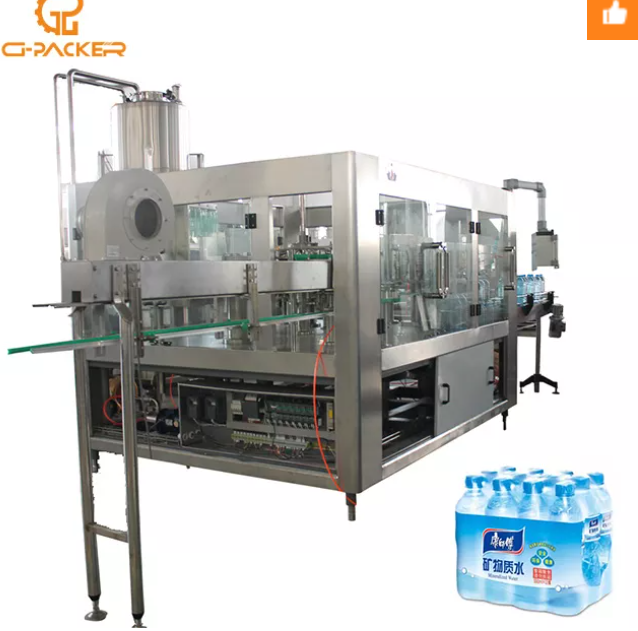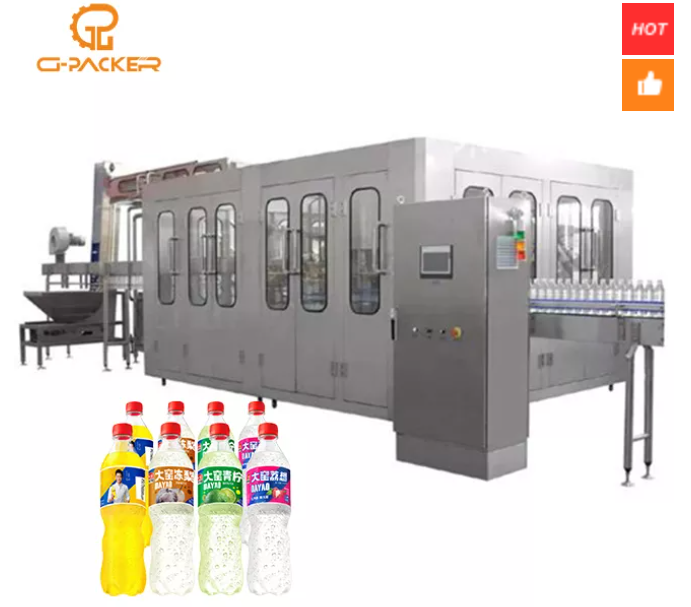
Automatic filling machines are transforming industries worldwide. Why are they so essential today? These machines enhance efficiency, precision, and safety, playing a crucial role in sectors like food and beverage, pharmaceuticals, and chemicals.
In this post, we’ll explore the key reasons why businesses should invest in automatic filling machines, highlighting their advantages and impact on productivity.
What is an Automatic Filling Machine?
Definition of Automatic Filling Machines
An automatic filling machine is a device used in various industries to automate the process of filling containers with liquids, powders, or other substances. These machines use sophisticated mechanisms to ensure accurate and efficient filling, minimizing human error and increasing production speed. By streamlining the filling process, automatic machines help companies improve productivity and maintain consistent product quality.
Types of Automatic Filling Machines
Automatic filling machines come in various types, each designed to meet specific needs depending on the product being filled.
Volumetric Fillers
These machines measure the volume of a product to be dispensed into containers. Ideal for liquids, they provide high precision and are commonly used in the food and beverage industries.
Piston Fillers
Piston fillers work by drawing the product into a piston chamber and then dispensing it into the container. These are suitable for thicker liquids, creams, and gels, providing precise control over filling volumes.
Gravity Fillers
Gravity fillers use gravity to dispense the product into containers. Typically used for liquids with a low viscosity, they are simple and cost-effective but are less accurate than piston or volumetric fillers.
Pressure Fillers
Pressure filling machines force the product into the container under controlled pressure. This method is often used for products that need to be dispensed quickly or with specific pressure, such as carbonated beverages.
Net Weight Fillers
These machines fill containers based on the net weight of the product. They are ideal for both solids and liquids, ensuring that each container holds the exact weight required.
Each type is tailored for different product characteristics, ensuring that businesses can choose the right machine based on their specific production needs.
Key Reasons to Use Automatic Filling Machines
Increased Production Efficiency
Automatic filling machines significantly speed up the filling process. They operate continuously, allowing for higher throughput compared to manual filling. Downtime is minimized since the machines can handle tasks without breaks, reducing human error. With automation, high-volume production runs are possible, meeting demand without compromising quality.
Consistency and Accuracy
Maintaining consistency and accuracy is vital for product quality. Automatic systems ensure each container is filled to the correct amount, minimizing overfills and underfills. This precision helps reduce waste, improve customer satisfaction, and maintain regulatory compliance, especially in industries like food and pharmaceuticals.
Cost Reduction
Automating the filling process leads to significant labor cost savings. It reduces the need for manual labor, allowing companies to reallocate resources to other important tasks. Additionally, operational costs are lowered by optimizing material use and reducing product waste. Over time, these savings accumulate, making automatic filling machines a smart investment for long-term efficiency.
Improved Workplace Safety
Automatic filling machines help minimize manual handling, which is especially important in industries dealing with hazardous substances, such as chemicals or pharmaceuticals. These machines enhance sanitation and hygiene by eliminating human contact with potentially dangerous materials. They also reduce the risk of contamination, offering a safer work environment and better product integrity.

Advantages of Automatic Filling Machines Over Manual Systems
Speed and Productivity
Automatic filling machines outperform manual labor by significantly increasing speed and throughput. These machines can run continuously without the need for breaks, leading to higher production capacity. In industries like food and beverage or pharmaceuticals, where efficiency is crucial, automatic systems can meet high demand quickly, allowing businesses to produce more in less time.
Minimizing Human Error
Manual filling processes often lead to inconsistencies, such as overfills or underfills, which can result in product defects. Automation eliminates these risks by ensuring that each container is filled with precision. The machine's ability to repeat the same action over and over guarantees reliable output, reducing costly mistakes and maintaining product integrity.
Enhanced Product Quality Control
The accuracy of automatic filling machines ensures that products are consistently filled to the correct levels. This consistency is especially important in industries like food and beverage, pharmaceuticals, and cosmetics, where even small deviations can affect quality and safety. By minimizing variations in the filling process, automatic systems help maintain high standards and comply with regulatory requirements.
Key Features to Look for in an Automatic Filling Machine
Versatility
Automatic filling machines should be versatile enough to handle a range of products and packaging types. Whether it's bottles, jars, pouches, or custom containers, the machine should be adaptable. Additionally, some machines can be customized to meet specific industry needs, making them suitable for different materials, such as liquids, powders, or even thick, viscous substances like creams.
Integration with Other Systems
One of the key benefits of automatic filling machines is their ability to integrate seamlessly with other systems in the production line. These machines can be connected to capping, labeling, and packaging systems, ensuring a smooth and efficient workflow from start to finish. This integration reduces downtime and the need for manual handling during the production process.
Ease of Maintenance and Cleaning
Maintenance and cleaning are crucial aspects of filling machines, especially in industries like food production. Machines should be easy to clean and maintain to prevent contamination and ensure optimal performance. Choose machines that are designed for quick disassembly and cleaning to meet hygiene standards and keep operations running smoothly.
Automation and Control Features
Modern automatic filling machines often feature user-friendly touchscreen interfaces that make operation simple and intuitive. These systems come equipped with programmable controls to adjust filling parameters, such as volume and speed. This flexibility ensures that the machine can adapt to various production needs, offering both precision and convenience.
Industries That Benefit from Using Automatic Filling Machines
Food and Beverage
In the food and beverage industry, automatic filling machines play a crucial role in streamlining production. These machines are commonly used to fill bottles with beverages, sauces, and condiments. Whether it’s soft drinks, juices, or even hot sauces, automatic machines ensure consistent and precise filling, improving both production speed and product quality.
E-Commerce and Retail Packaging
Automatic filling machines are also widely used in e-commerce and retail packaging, especially for small or large batch production of retail goods. From cosmetics to household cleaners, these machines are designed to handle different packaging formats, making them versatile for both small-scale and high-volume production. Their automation capabilities help meet the demands of fast-paced retail markets, ensuring quick turnaround times and reliable output.
Choosing the Right Automatic Filling Machine for Your Business
Factors to Consider
When selecting an automatic filling machine, several factors should be taken into account. First, consider the product characteristics such as viscosity, volume, and consistency. For example, thicker liquids like sauces or creams require different machines than thin liquids like juices.
Another key consideration is desired output speed. If your production demands high throughput, you'll need a machine capable of handling larger volumes per minute. Additionally, the flexibility for different types of packaging is important. Ensure the machine can handle various container types such as bottles, pouches, or jars, depending on your business needs.
Cost vs. Benefit Analysis
Performing a cost vs. benefit analysis is essential when investing in an automatic filling machine. To assess the return on investment (ROI), consider both the initial cost of the machine and its long-term benefits in terms of productivity, efficiency, and labor savings.
Also, think about maintenance costs and the energy consumption of the machine. Machines that are energy-efficient and require minimal maintenance often provide better value in the long run. Factor in these costs to ensure that the machine delivers the best possible return over its lifespan.
Common Challenges with Automatic Filling Machines and How to Overcome Them
Machine Calibration and Setup
Proper machine setup and regular calibration are crucial for maintaining the accuracy of automatic filling machines. If the machine is not calibrated correctly, it may result in overfills or underfills, affecting product quality. Regular checks and adjustments are needed to ensure the machine operates within the desired parameters. Operators should be trained to perform basic calibrations and ensure the system remains in top condition.
Maintenance and Downtime
Like any mechanical system, automatic filling machines require regular maintenance to prevent unexpected breakdowns. Regular inspections and part replacements can help identify and address issues before they cause production delays. Scheduling routine maintenance and having spare parts available can minimize downtime, ensuring smooth and continuous operation.
Compatibility with Packaging Types
Automatic filling machines must be compatible with various packaging formats and sizes. Businesses often face challenges when switching between different types of containers, such as bottles, jars, or pouches. To overcome this, machines should offer easy adjustments for packaging changes. Additionally, businesses should invest in machines that can handle a wide range of sizes and types, ensuring flexibility in their production line.
Future Trends in Automatic Filling Machines
Advanced Automation and Smart Features
The future of automatic filling machines lies in advanced automation and smart features. With the integration of the Internet of Things (IoT), these machines can now monitor performance in real-time and autonomously adjust settings to optimize filling accuracy and speed. IoT-enabled machines can track variables such as temperature, viscosity, and fill levels, ensuring consistent output while reducing human intervention. These innovations are not only increasing efficiency but also enhancing machine diagnostics and preventive maintenance.
Sustainability in Automatic Filling Machines
As sustainability becomes more important, energy-efficient machines and eco-friendly designs are leading the way in automatic filling technology. Manufacturers are now focusing on creating machines that use less energy, reducing the environmental footprint. Additionally, advancements in machine design aim to reduce material waste by optimizing product usage during the filling process. These eco-friendly initiatives not only help companies reduce operational costs but also support global sustainability efforts.
Conclusion
Automatic filling machines enhance efficiency, accuracy, and product quality while reducing labor costs. Automation plays a crucial role in industries like food, pharmaceuticals, and chemicals. By adopting these machines, businesses can improve production speed and maintain consistency.
Evaluate your filling needs to explore how automatic filling machines can help you stay competitive and reduce long-term costs.
FAQ
Q: What are the main benefits of using automatic filling machines?
A: Automatic filling machines increase production speed, ensure accuracy, and reduce labor costs. They also minimize human error and improve product consistency, making them ideal for high-volume industries like food, pharmaceuticals, and chemicals.
Q: How do automatic filling machines improve product quality?
A: These machines provide precise measurements, ensuring each container is filled to the correct level. This consistency reduces the risk of overfills or underfills, maintaining high-quality standards in industries such as food and beverage or cosmetics.
Q: Are automatic filling machines suitable for different product types?
A: Yes, automatic filling machines are versatile and can handle various products, including liquids, powders, creams, and viscous materials. They are customizable for different packaging types, making them ideal for industries with diverse production needs.


















